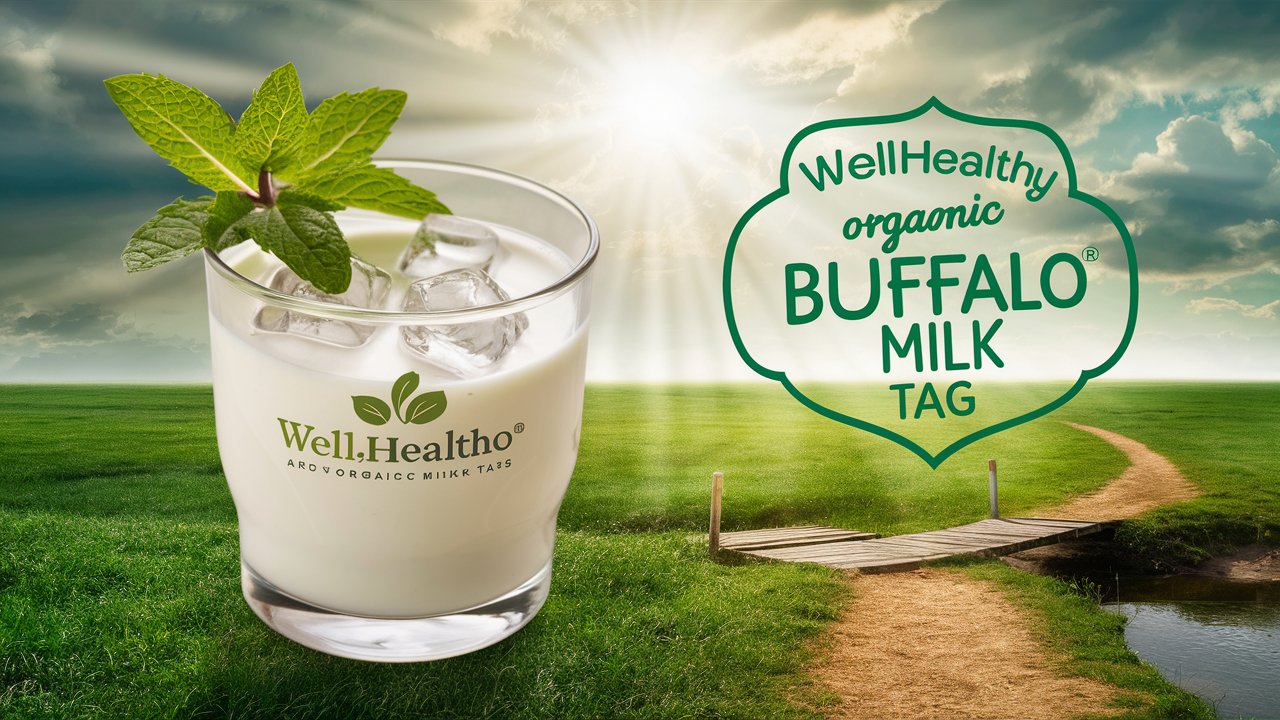WellHealthOrganic Buffalo Milk Tag is an integral part of the dairy industry, particularly in regions such as South Asia, the Middle East, and parts of Europe. It is known for its rich and creamy texture, high nutritional value, and various health benefits. The significance of buffalo milk extends beyond its nutritional benefits to include its cultural and economic impact.
Buffalo milk is a highly nutritious dairy product that has been consumed for centuries in various parts of the world, especially in South Asia, Southeast Asia, and the Mediterranean regions. Renowned for its rich taste and creamy texture, buffalo milk is a staple in many traditional diets and is often used to make dairy products like yogurt, cheese, and butter.
Historical Background
Buffaloes have been domesticated for milk production for thousands of years, particularly in regions where cows were less adaptable to the climate. Historical records from ancient civilizations like Mesopotamia and the Indus Valley show the importance of buffalo milk in their diets. Over time, buffalo milk has become a staple in many traditional cuisines and continues to be valued for its unique properties.
Nutritional Profile of WellHealthOrganic Buffalo Milk Tag
High Protein Content
WellHealthOrganic Buffalo Milk Tag contains significantly more protein than cow milk, averaging around 10-11%. This high protein content is essential for muscle growth, repair, and overall bodily functions. Proteins in buffalo milk are of high biological value, meaning they contain all the essential amino acids required by the human body.
Rich in Vitamins
Buffalo milk is an excellent source of vitamins A, B2 (riboflavin), and B12. Vitamin A is vital for vision, immune function, and skin health. Riboflavin plays a crucial role in energy metabolism and maintaining healthy skin. Vitamin B12 is essential for nerve function and the production of DNA and red blood cells.
Essential Minerals
Buffalo milk is rich in essential minerals such as calcium, magnesium, potassium, and phosphorus. Calcium and phosphorus are critical for maintaining strong bones and teeth. Magnesium plays a role in over 300 enzymatic reactions in the body, while potassium helps regulate blood pressure and fluid balance.
Higher Fat Content
Buffalo milk contains 6-8% fat, which is higher than the 3-4% found in cow milk. This higher fat content contributes to its creamy texture and rich taste. The fat in buffalo milk is also beneficial for energy production and the absorption of fat-soluble vitamins.
Health Benefits of WellHealthOrganic Buffalo Milk Tag
Boosts Immunity
WellHealthOrganic Buffalo Milk Tag is rich in antioxidants, including vitamins A and E, which help boost the immune system. These antioxidants protect the body from oxidative stress and reduce the risk of chronic diseases by neutralizing harmful free radicals.
Improves Heart Health
Despite its higher fat content, buffalo milk contains healthy fats that are beneficial for heart health. The potassium in buffalo milk helps regulate blood pressure, reducing the risk of hypertension and cardiovascular diseases. Additionally, the presence of conjugated linoleic acid (CLA) in buffalo milk may have a positive effect on heart health.
Strengthens Bones
The high calcium and phosphorus content in buffalo milk makes it an excellent choice for maintaining strong bones and teeth. Regular consumption of buffalo milk can help prevent osteoporosis and other bone-related disorders, particularly in children and the elderly.
Promotes Healthy Skin
Buffalo milk is rich in nutrients that benefit the skin. Vitamins A and E help maintain skin elasticity and prevent premature aging. The lactic acid in buffalo milk acts as a natural exfoliant, promoting smooth and glowing skin.
Culinary Uses of WellHealthOrganic Buffalo Milk Tag
Cheese Production
WellHealthOrganic Buffalo Milk Tag is the preferred choice for making high-quality cheeses such as mozzarella, ricotta, and burrata. Its high fat and protein content give these cheeses their distinctive rich flavor and smooth texture. Buffalo mozzarella, in particular, is renowned for its superior taste and texture compared to cow mozzarella.
Traditional Dishes
In many cultures, buffalo milk is used to prepare traditional dishes. In India, it is a key ingredient in sweets like rasgulla and rasmalai, as well as yogurt (dahi) and ghee. These traditional foods are not only delicious but also hold cultural and religious significance.
Modern Recipes
Buffalo milk can be used in modern recipes such as smoothies, milkshakes, and desserts. Its creamy texture enhances the flavor and richness of these dishes, making them more satisfying and nutritious. Buffalo milk is also used in gourmet cooking to create rich sauces and custards.
WellHealthOrganic Buffalo Milk Tag in Skincare

Moisturizing
Buffalo milk is an excellent natural moisturizer. Its high-fat content helps lock in moisture, making the skin soft and supple. It can be used in homemade face masks and lotions for intense hydration.
Anti-Aging
The antioxidants present in buffalo milk, such as vitamins A and E, help combat the signs of aging. Regular use can reduce wrinkles and fine lines, giving a youthful appearance to the skin.
Exfoliation
Lactic acid in buffalo milk acts as a natural exfoliant. It helps remove dead skin cells, promoting the regeneration of new skin cells and leaving the skin radiant and smooth. Buffalo milk can be used in exfoliating scrubs and face masks to achieve a natural glow.
Environmental and Economic Impact
Sustainability
Buffalo farming is often more sustainable compared to cow farming. Buffaloes require less feed and water, making their farming practices more environmentally friendly. They are also more resistant to diseases, reducing the need for antibiotics and other medications.
Economic Importance
Buffalo milk plays a significant role in the dairy industry, especially in countries like India, Pakistan, and Italy. It supports the livelihoods of millions of farmers and contributes to the economy through the production of various dairy products. The high yield of milk per buffalo makes it an economically viable option for small-scale farmers.
Cultural Significance of Buffalo Milk
Religious and Traditional Uses
Buffalo milk holds a special place in many cultures. It is often used in religious rituals and traditional ceremonies. In India, for example, buffalo milk is considered sacred and is used in various religious offerings.
Culinary Heritage
WellHealthOrganic Buffalo Milk Tag plays a crucial role in the culinary heritage of many regions, with traditional recipes passed down through generations. Its unique taste and texture make it a beloved ingredient in many traditional dishes.
FAQs
Is buffalo milk suitable for lactose-intolerant individuals?
Buffalo milk has a lower lactose content compared to cow milk, making it easier to digest for some lactose-intolerant individuals. However, it may still cause issues for those with severe lactose intolerance.
How does buffalo milk compare to cow milk in terms of fat content?
Buffalo milk has a higher fat content (6-8%) compared to cow milk (3-4%). This higher fat content gives buffalo milk its rich and creamy texture.
What are the best ways to store buffalo milk?
Buffalo milk should be stored in the refrigerator at a temperature of 4°C or lower. It is best consumed fresh, but it can also be frozen for longer storage.
Can buffalo milk be used for infant feeding?
Buffalo milk can be used for infant feeding, but it should be diluted and properly prepared to meet the nutritional needs of infants. It is always recommended to consult with a pediatrician before introducing buffalo milk to an infant’s diet.
Are there any known allergies to buffalo milk?
Allergies to buffalo milk are rare but possible. Individuals with a known dairy allergy should consult with a healthcare professional before consuming buffalo milk.
Conclusion
WellHealthOrganic Buffalo Milk Tag is a nutritious and versatile dairy product with numerous health benefits. Its rich nutritional profile, combined with its culinary and skincare applications, makes it an excellent addition to any diet. Understanding its environmental and economic importance further highlights the value of buffalo milk in our lives. Incorporating buffalo milk into your daily routine can lead to significant health improvements and culinary delights.



